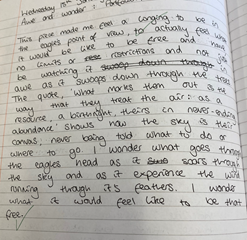Inspired and informed by our Y7 group work project with the EMC, I was interested in seeing how the findings from this research could develop teaching and learning in other year groups, especially with regards to the study of poetry at GCSE. In particular, I wanted to investigate how some phrases Barbara Bleiman had suggested teachers might use when modelling their own thinking and talk about poetry (see below) could be helpful for students when faced with a first reading of a poem from their GCSE Anthology.
Thinking in an exploratory way about poems – phrases a teacher might use to model an initial response:
I like…
I like this because…
It makes me wonder. I keep coming back and puzzling over…But that’s fine. There’s always more to see in it.
I like the sound of the words, especially…
I love the way it…..
It surprises me. I don’t expect poems to….
I like the way it ends…
I want to keep reading it because…
I like the way it seems like…
I’m still not sure why… or why….
I don’t understand …
I use Socratic discussion frequently in these lessons, a method by which an inner group of students discusses its initial thoughts about a text whilst an outer group observes the thinking and talk and then gives feedback on it. What we’ve noticed as a group is that whilst preparing their thoughts prior to the discussion, the inner group will often begin by annotating the poem by ‘technique spotting’ and will then try to use this information to initiate discussion. When I’ve taken in A-Level exam papers, I’ve noticed that this is often all that is sometimes written in planning at this level too and has in fact provided the student with very little of any real use when attempting to explain what the text is about.
There are several issues with this. Talk is led by the identification of the technique which students can subsequently find challenging to explain because they’re not sure why the technique has been used. As a result of this, there is an attempt to go analytically into the poem before the ‘bigger picture’ has been established. We were finding that talk became stunted and lacked any dialogic quality too. Students were simply making a series of identifications about certain elements of the poem without actually ‘getting it’ (a phrase they frequently use). The teaching of PEE has been partly responsible for this too. Make your Point, provide your Evidence and include a technique in your Explanation has made students believe that, with regards to formal assessment, marks can be gained in this way. Do it enough times and they can assume you’ll get lots of marks.
In one particular Y10 lesson that began with an unseen discussion of Hughes’ ‘Bayonet Charge’, this very thing happened. I then suggested that we try using some of the phrases from the Y7 project, particularly directing them towards the simple expression ‘I like’ as a way in to expressing their initial response to the poem. It was intriguing what happened. Students suddenly found it easier to make a more thoughtful and meaningful comment by identifying how the poem made them feel. ‘I like how the poem just starts off with ‘Suddenly he awoke’…’ began one of the boys in the discussion. ‘…it gives it a sense of realisation…he wakes up and he has to start running for his life’.
In the post-lesson interview, students made some fascinating comments about this. One girl states how, ‘We’re not used to using these phrases…we’re used to thinking about technical devices’. Another students says, ‘If you know what you like, you can explain and expand upon it.’ They then suggest that teachers stopped asking them what they liked about texts when they came to secondary school and that it seemed ‘childish’ for them to talk about why they liked what they had read. These students have got the perception that to think and write in a ‘more mature way’ (a more ‘academic’ way?) about a text means to know your poetry-specific subject terminology and to look for these details immediately because, from their understanding, this is what you do when you analyse, and this is therefore what will move you further up the mark scheme. I admit I may have played my part in making them think like this; not directly, but perhaps through assessment pressures and explanations that have been misconstrued.
I experienced further issues with the notion of ‘subject terminology’ in the summer in my work as a Senior Examiner for GCSE English Literature. In the new mark scheme, in AO2, appears the phrase ‘subject terminology’ which in a number of cases appears to have been misconstrued as meaning that students should litter their essays with such things as word-class terminology, most commonly verbs, adjectives, adverbs and nouns (often incorrectly identified). Examiners, however, when assessing responses were asked to think about subject terminology more broadly, for example, an essay that uses phrases like ‘character’ and ‘setting’ is employing the subject terminology of English Literature and that these are methods used by the writer to construct meaning. I am not suggesting that it is not important or interesting to learn a metalanguage to discuss English Literature and how writers do what they do, but the emphasis on identifying writers’ techniques at the expense of thoughtfully and pleasurably understanding a text and its ideas must be what drives the way we engage our students in our subject. Ask them what they like and they’ll tell you!




